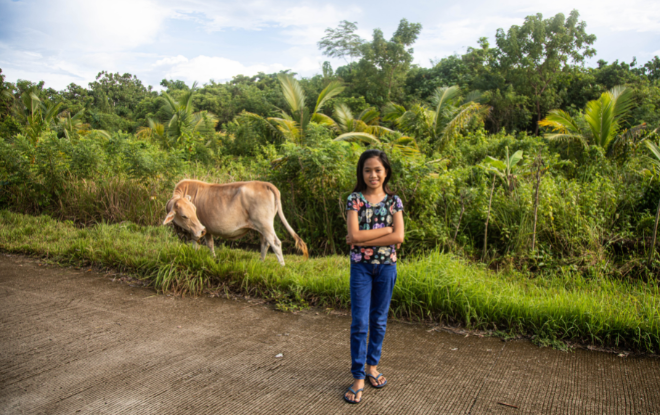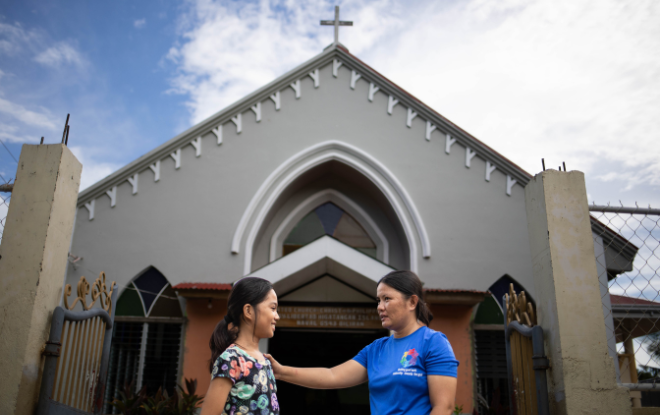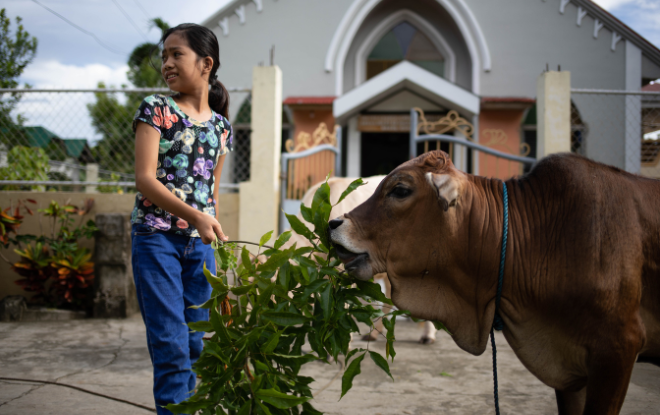Sponsor gift leads to unusual pet for Solen
9749 0
The Philippines is largely an agricultural country, but many Filipino farmers lack modern machinery and still work hard with their calloused hands. Enter the humble cow—a diligent and reliable beast of burden that works as hard Filipino farmers.
To young Solen, however, their family cow is more than just a work animal. To this lovely little girl, their cow is a pet. She even named him “Pedro”.

Solen with the cow the family bought with money gifted by her sponsor.
“I named him Pedro after my sponsor, Peter,” Solen says with a big, proud smile.
Eleven-year-old Solen is the only child of Judito and Solidad.
“She’s an amazing daughter,” says her mother, Solidad. “She is a top student in her class, studies well, and makes sure to help me with some house chores after she comes home from school. I know very clearly that one of the reasons she is such a disciplined and respectful girl is because she regularly goes to church and the Compassion centre.”
Solen is part of a Compassion sponsorship programme on the picturesque island of Higatangan. “I love learning about God and writing to my sponsor,” Solen says.
Solen wants to be a teacher someday, but what really makes her happy after school is feeding their two cows—the mother cow and Pedro, Solen’s pet calf. “This is my favourite chore!” she says. She even asks her friends to tag along to see Pedro.
Her father, Judito, is a fisherman. Like most fathers on Higatangan Island. But his very small earnings from fishing got even smaller after the pandemic. There was no way the family could afford to buy a cow. That is why Judito and Solidad were ecstatic when they received a special gift from Solen’s sponsor—a cow.

Solen talks with her child development worker, Irene, outside the church.
Solen’s child development worker at the Compassion centre is Irene, who explains why owning a cow is especially important on this island. She says the land here is not fertile because of coral, so water buffalo are the preferred farm animal. However, most families own a cow to raise and then sell their calves for profit.”
Irene and the staff of the Compassion centre know exactly what the sponsored children and their families need. Child development workers like Irene regularly visit the sponsored children to monitor their health, personal growth, performance in school, family life, and overall well-being, including their spiritual development.
So, when Solen received money from her sponsor, Irene knew how the family could best use the gift.
Irene advised them to buy a cow, to which Solidad agreed with delight. The family was also able to buy some animal feed, groceries, and a fishing net from the money gift. “I’ve always wanted to raise a cow because I have heard how some of our neighbours earn profit from selling young cows,” Solidad says. After a few months, their cow birthed little Pedro.

Solen feeds her pet calf, Pedro, which she named in honour of her sponsor, Peter.
Solen says with a grin, “I was really afraid of cows. I didn’t like them. I see cows around, and I think they are too big, smelly and ugly. But when Pedro was born, I began to like cows. Pedro is my pet, although I still think he is smelly.”
Their neighbours know about the sponsorship programme, the church, and Pedro and his mother cow. They can clearly see the way God has blessed the family through the programme.
Solen is proud—not many girls on the island have a calf they can call their own! Of course, Solidad decided not to sell their first calf. He holds too much value for the family; he is a reminder of God’s goodness and blessing and the generosity of Solen’s sponsor.
“Pedro means something to our family,” Solidad says. “I will not sell him for profit, not only because he is my daughter’s pet, but also because he represents Solen’s kind sponsor. We named him Pedro for a reason. Our cows remind us that someone in another country genuinely cares for my daughter very much. And we are so grateful.”
Sponsor a child today